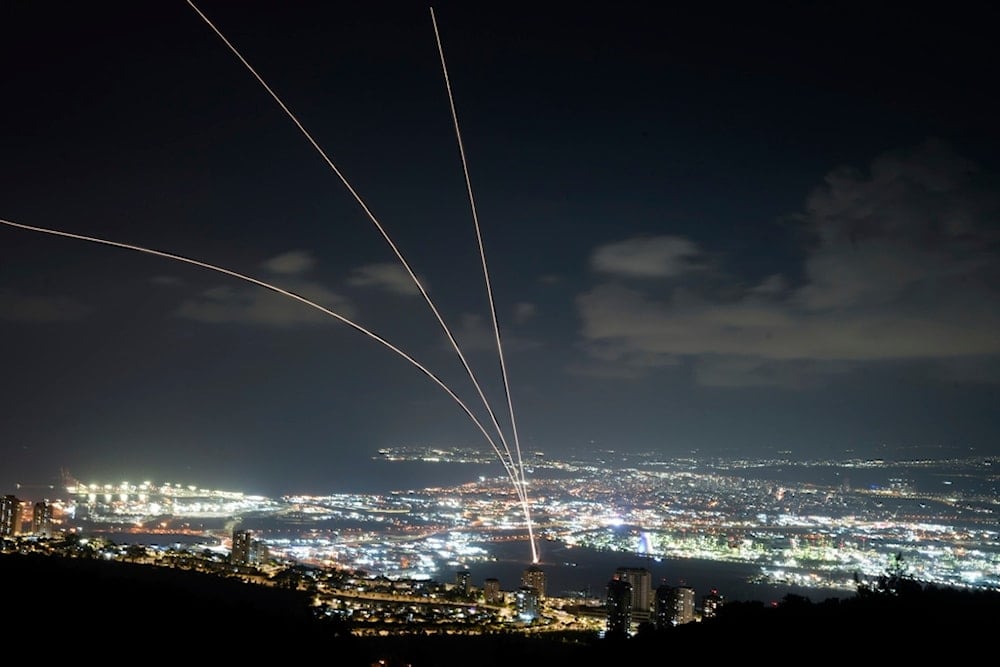'Israel's' multi-layered air defense system has no solution to drones
An opinion piece published in Israeli newspaper Maariv suggests the Israeli military must further take its military strategy to additional offensive measure.
-

Israeli Iron Dome air defense system fires to intercept rockets that were launched from Lebanon, as seen from Haifa, northern occupied Palestine, Monday, Sept. 23, 2024. (AP)
The drone disaster at the Golani Brigade's base in Binyamina, along with its consequences, has left not only a deep sense of pain but also frustration and helplessness, an opinion piece in Maariv said, referring to Hezbollah's drone strike south of the occupied city of Haifa, which killed at least four soldiers and wounded dozens.
"A pressing question remains: how is it possible that the sophisticated, modern army equipped with the best multi-layered air defense system in the world, featuring top-tier missiles and aircraft, has no solution against drones—a weapon that appears almost toy-like compared to the IDF’s impressive capabilities?" the piece questioned, referring to the Israeli occupation military's capacity.
The writer considered that Hezbollah's drone incident was "essentially a continuation of the October 7 failure, reflecting a pattern of rigid thinking, arrogance, and a refusal to face reality under the illusion that the enemy is deterred, won’t dare act, and that everything is under control."
He further underlined that "Israel" "cannot afford to fight for survival within its own borders," and therefore, its military strategy must focus primarily on offensive capabilities.
The rapid and deadly developments in modern warfare require innovative, outside-the-box thinking, rather than adding more layers of defense, the author said, pointing out that in modern warfare, there are no absolute victories like in the past, where a flag was planted on a palace or hilltop.
"Victory today is achieved through surprising and overwhelming force, leaving the enemy stunned and powerless, while remaining prepared for the next strike that will throw the enemy off balance."
In the same context, it was emphasized that modern wars cannot be prolonged, as they harm the economy and morale, and a weakened economy directly undermines military capability and battlefield success.
Elsewhere, the piece also pointed out that while systems like Iron Dome, Arrow, and David's Sling provide protective layers that have undeniably prevented catastrophic outcomes, they are not without limitations.
"If we didn't have this 'shield wall', we would have had to use our full attack capabilities even more for our existence and we would have worked with all our might to prevent our enemies from reaching such launch capabilities, and of course not allow them to launch the unimaginable quantities of the missiles and UAVs towards the State of Israel," the writer concluded.
Read more: Israeli settlers describe chaos after deadly Hezbollah drone strike
Shocked by Hezbollah Haifa strike, Israeli officials, media vent out
Another report published in Maariv also described Hezbollah's drone attack in Binyamina as "difficult, disturbing, and problematic" for the Israeli military, pointing out that the main problem lies in "Israel's" failure to complete the development of a laser-based interception system to address this challenge.
"Israel" currently lacks a dedicated interception system to handle drones launched from Lebanon, Gaza, Syria, Iraq, Iran, and Yemen, Maariv emphasized.
It indicated that the severe incident in Binyamina marks another milestone in the ongoing fighting between "Israel" and Hezbollah, highlighting the complex challenges that the Lebanese group poses to the Israeli air defense systems.
Maariv explained that the chances of downing a drone are lower than intercepting missiles, and this is why Hezbollah and other factions have chosen this weapon, stressing that the Israeli military "must act defensively" to bring down these drones.
The newspaper recalled Hezbollah’s April attack using a combination of anti-tank guided missiles, rocket-propelled grenades, and two suicide drones. It also referred to two explosive drones that struck Hurfeish a few months later and another attack in the same month when an explosive drone targeted northern Golan.
Maariv cited Rotem Meital, CEO of Asgard Systems in Tel Aviv, which develops military technology for the Israeli defense industry, as saying that drones, by nature, have a particularly challenging radar signature, especially when flying at low altitudes, which complicates radar detection.
Israeli media shared a common headline regarding Hezbollah's latest top-tier drone strike, describing it as a disaster.
Gideon Levy, a renowned Israeli political analyst, has warned that the recent Hezbollah attack in Binyamina signals a costly conflict for "Israel".
"This is just the beginning of the war in Lebanon, not the end," he indicated, warning that the war's enthusiastic supporters should be prepared for severe consequences.
Meanwhile, the Israeli Walla news website expressed growing fear of the Lebanese Resistance's capabilities, saying, "We were told that Hezbollah is defeated and broken, but it proved last night that it is still capable of being fatal," with other Israeli media reporting that "Hezbollah succeeded in recovering despite the "blows" it was dealt."
Read more: Hezbollah drone strike exposes gaps in 'Israel's' air defense: AP

 5 Min Read
5 Min Read








